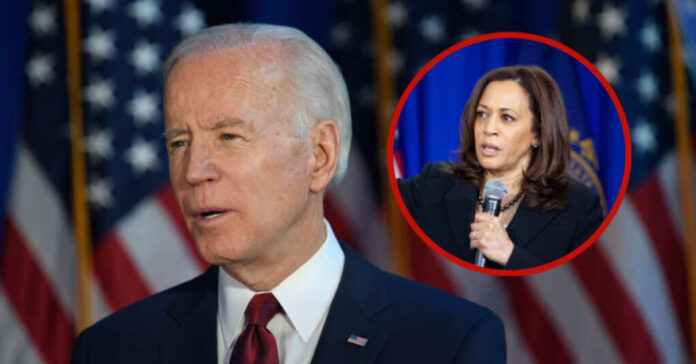As Kamala Harris continues her campaign for the 2024 election, seeking a second term with Joe Biden, a new book has revealed their deteriorating relationship. The recently released book claimed that President Joe Biden was well aware of Vice President Kamala Harris’s perceived inadequacies in the role of commander-in-chief.
The author goes even one step further to claim that the “real reason” Biden decided to run for a second term is because “Kamala is not up to the job.” The Bidens don’t want to see her have a chance at the presidency. Neither the First Lady nor the President trusts or likes the Vice President any longer.
The book, titled “Amateur Hour: Kamala Harris in the White House” by veteran Washington journalist Charlie Spiering, suggests that Biden initially favored Michigan Gov. Gretchen Whitmer as his running mate in the 2020 election but succumbed to public pressure and selected Harris.
Biden’s choice for the VP position was influenced by lobbying from former President Barack Obama just days before the virtual Democratic National Convention in 2020. Despite reservations, Biden ultimately decided on Harris, who is described in the book as being “a brain stroke away from the presidency.” However, Biden couldn’t ignore Harris’s numerous struggles and mistakes during her initial years in office, which have become a focal point as he enters his reelection campaign at 81 years old.
The book highlights some of the issues, including Harris’s alleged “bullying” of White House staff, her reluctance to be a “team player” and collaborate with the administration, and her perceived artificial public persona. It also mentions her infamous cackle and frequent use of “word salads” that fail to convey coherent messages. Harris’s team has reportedly experienced a steady stream of resignations due to her “soul-destroying criticism.”
Spiering characterizes Harris as a “hilarious, incompetent, trailblazing radical” who faced disastrous and comical first years as vice president, particularly in her limited authority as the Biden administration’s border czar. Despite these challenges, Biden is now campaigning alongside Harris, raising the question in Washington of how to address and rectify the issues associated with her role.
The book reveals that Biden preferred Whitmer, but Jill Biden had considered former Obama national security adviser Susan Rice for the VP role. The book also highlights how the First Lady and the President no longer trust or like the Vice President, which is surprising given their historic win four years ago. Jill Biden reportedly expressed frustration after a Democratic primary debate, stating that Harris should “go f–k” herself. The tension arose during a June 2019 debate when Harris criticized Biden for his collaboration with segregationist senators in the 1970s.
Harris, who was running for president at the time, later suspended her campaign but capitalized on the opportunity to boost her profile following George Floyd’s death in May 2020. Biden’s team, influenced by the desire for a black woman as a running mate, eventually chose Harris after Obama encouraged Biden to let go of past considerations.
Spiering notes that Biden was aware of Harris’s lacking political skills but made what he describes as “one of the most pandering decisions of any vice-presidential pick in modern history.” Despite the decision, Harris purportedly displayed impatience and disdain for the President during their time in office.
As the 2024 general election approaches with less than 300 days remaining, Harris finds herself in a challenging position, unable to reshape her image despite numerous attempts at narrative resets and on-the-job training. Spiering suggests that reshuffling the Biden-Harris ticket would require admitting a significant mistake. Spiering asserts that once someone is perceived as unworthy, changing public opinion becomes a daunting task. The negative chatter behind the scenes remains unspoken mainly, as few dare to criticize publicly, fearing accusations of racism or sexism.

















